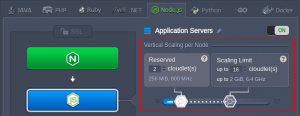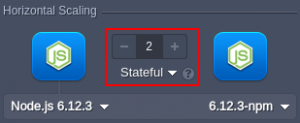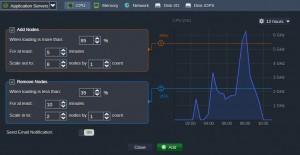Automatic Vertical Scaling
Cantech Cloud PaaS dynamically provides the exact amount of resources (RAM and CPU) required by your nodes according to the current load with no manual intervention required. As a result, you never overpay for unused resources and save your time as the platform eliminates the need to handle the load-related adjustments or architectural changes.
You just need to set the upper cloudlets limit (each one equals to 128 MiB of RAM and 400 MHz of CPU) for your NodeJS application server and everything else will be handled by platform automatically.
Refer to the automatic vertical scaling documentation for more information.
Manual Horizontal Scaling
To scale out/in NodeJS application servers, you need to access the topology wizard and click the +/- buttons within the Horizontal Scaling section to set the required number of nodes. Also, starting with the 5.5 platform version, you can adjust the preferred scaling mode:
- Stateless – simultaneously creates all new nodes from the base image template
- Stateful – sequentially copies file system of the master container into the new nodes
The maximum number of the same-type servers within a single environment layer depends on a particular hosting provider settings (usually this limit stands for 16 nodes and can be enlarged by sending the appropriate request to support).
Also, for the proper requests distribution, a load balancer instance is automatically added upon NodeJS server scaling. Refer to the horizontal scaling documentation for more details.
Automatic Horizontal Scaling
Access the environment Settings > Monitoring > Auto Horizontal Scaling section to set up special tunable triggers, which allow to increase or decrease the number of nodes due to the application load. Configure type of resource to be monitored (CPU, RAM, Network, Disk) and the exact condition of scaling.
Learn more about automatic horizontal scaling in the linked document.
In addition, hosting at cloud allows using other inbuilt tools and features, for example:
- Custom or cloud SSL
- Public IPv4 and IPv6
- A wide range of managed software stacks
- Container firewalls, endpoints, and environment isolation
- User-friendly UI and direct SSH access for management
- Open API and Cloud Scripting for automation
- Pay-as-you-use pricing model
- Collaboration functionality for teamwork
- Multi-cloud distribution
As you can see, cloud PaaS provides all the necessary conditions for smooth Node.js hosting!
If you need any help contact our support, Open support ticket from client area.



